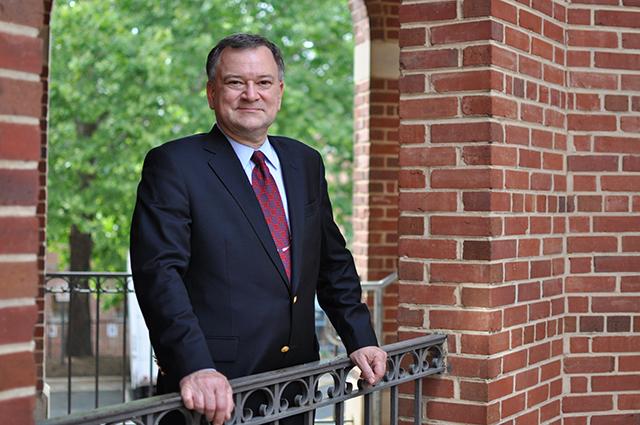After serving for 11 years as the first permanent director of N.C. State’s University Honors Program, Larry Blanton will be stepping down from this position at the end of the month. Blanton, who is also a professor of plant biology, will return to the College of Agriculture and Life and Sciences as the Director of Graduate Programs in Plant Biology. With more than a decade of experience and having witnessed numerous changes over the years, Blanton said he is eager to see someone else fill his shoes and take the program forward.
Blanton began his tenure as director in 2003, at a time when the Honors Program was just getting started. With only a small number of students and nothing more than a vision to guide them, Blanton and his colleagues worked long and hard to improve the program.
“When the program first started, it was a little too much like the University Scholars Program,” Blanton said. “We decided that we would emphasize to incoming students that the Honors Program is about research and scholarship, and University Scholars is a program of enrichment. That allowed the Scholars Program to focus on what they do best, and allowed us to focus on what we do best.”
Aside from implementing this, Blanton said his role shifted to explaining the program’s goal to prospective students.
“It’s a bit of a tough sell to your average high school student,” Blanton said. “From the high school perspective, getting across that notion of what research and scholarship mean, and particularly in disciplines beyond the sciences, can be difficult. It’s always a tough sell to, say, an accounting major. The focus is to get that message out.”
The program’s first run in 2003 consisted of approximately 95 students, Blanton said. Now, the entering class for the fall of 2014 is just short of 200.
“That’s been the big thing, is to focus on the flowering and the vision of research and what that really means,” Blanton said. “It’s our job to build the excitement level of students and build retention. As with everything, you sort of start with survival. At the beginning it was sort of just getting things to move forward, and then after that you’re able to start to pursue new and interesting things, interesting and unusual student research projects.”
In terms of managing the ideas of the program’s students, Blanton said this is one of his primary goals.
“The trick is to find ways to facilitate their ideas and make them happen,” Blanton said. “We once had a community outreach project that a student from another seminar I was teaching had the idea for. She was interested in doing something to impact math and science education.”
Knowing that they wanted to make this a sustainable project and have it involve other students from the Honors Program, Blanton and his colleagues talked with some of their campus partners who worked in the College of Education. After meeting with a number of directors and various departments, they were able to get the project on its feet, and it’s still in operation to this day.
“Once that got going, one project led to the next,” Blanton said.
Blanton said several students within the program are working on publishing an undergraduate research journal, which they hope to release in the fall.
Blanton also said that many student ideas are facilitated by Aaron Stoller, the program’s associate director. Once students bring their project ideas to him, he and Blanton start the process of moving the projects forward.
“A lot of the program is about having the right people group at the right time, the sort of pioneering types who are going to make things happen,” Blanton said. “Now that we’re more mature, we’re really trying to expand our horizons and go more in depth.”
Yet despite the success of the Honors Program, Blanton stated that there have been significant drawbacks. The biggest is acquiring a substantial amount of financial support for the program.
“It always comes down to money,” Blanton said. “The program was actually very well-funded at the beginning. And to a certain extent, just because of the way budgets work, it was a matter of resorting things around.”
Blanton said the main reason budget restraints are disappointing is because he and his colleagues know what the program is capable of. Without the proper financial support, the program’s seminars and student projects are more limited. He also said finances continue to be a struggle to this day.
Yet money is not the only problem. Blanton said that a prominent struggle is to have a diversity of majors represented within the program.
“It’s been an ongoing challenge to expand outside the sciences,” Blanton said. “There are a couple of problems that factor into that. One is getting across the notion to a prospective humanities student about why the honors program would be beneficial to them. Yet because there are several entry points into the program that aspect helps provide more diversified majors.”
Blanton said one of the reasons he felt it was a good time to leave is because more integration to the university fabric is difficult, given that N.C. State is college-centered. The Honors Program mainly composed of engineering students, and there is a continual under-representation of education and economics majors.
“Our ideal goal is for the diversified majors within our entering class to be reflective of the percentages of the university’s entering class,” Blanton said.
In terms of whether a new director has been selected, Blanton said they are still in the process of interviewing candidates for the position. Although his last day is currently scheduled to be June 30, Blanton said he will stay until a new director is officially hired. Blanton said he hopes the Honors Program will continue to thrive and receive strong support after he resigns.
Aaron Stoller, the assistant director of the University Honors Program, also expressed his gratitude toward Blanton.
“He has had a massive impact not only on the program, not only on the program but also on the University during this time,” Stoller said. “He is the first director, and so he has really shaped the foundation of everything the program is.”
“Always the most rewarding experience is working with the students,” Blanton said. “You get this kind of vicarious success where you see them from this very early stage, and where they’re at a point where they’ve got something but aren’t quite sure what they want to do. Then you see them go on to do all these great things, and that’s amazing. It’s the hardest thing to leave.”





